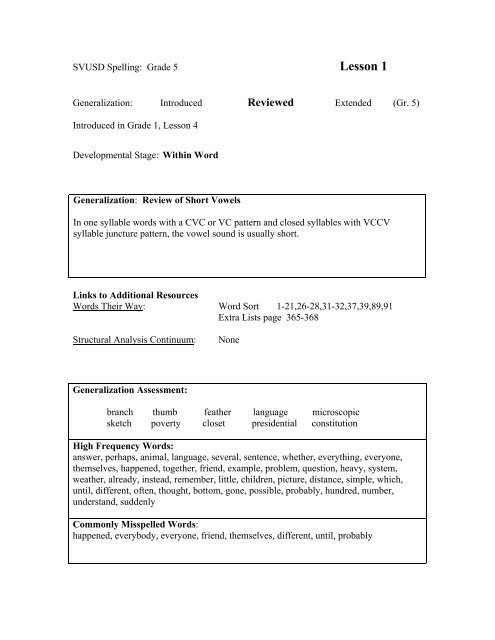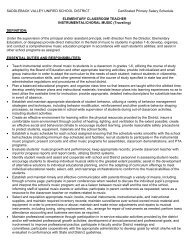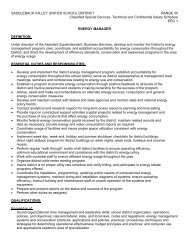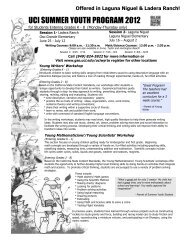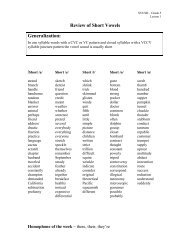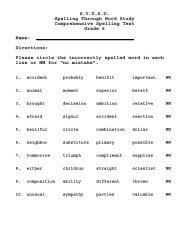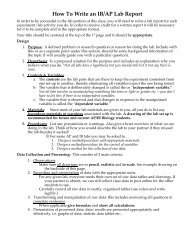SVUSD Spelling: Grade 6
SVUSD Spelling: Grade 6
SVUSD Spelling: Grade 6
You also want an ePaper? Increase the reach of your titles
YUMPU automatically turns print PDFs into web optimized ePapers that Google loves.
<strong>SVUSD</strong> <strong>Spelling</strong>: <strong>Grade</strong> 5 Lesson 1<br />
Generalization: Introduced Reviewed Extended (Gr. 5)<br />
Introduced in <strong>Grade</strong> 1, Lesson 4<br />
Developmental Stage: Within Word<br />
Generalization: Review of Short Vowels<br />
In one syllable words with a CVC or VC pattern and closed syllables with VCCV<br />
syllable juncture pattern, the vowel sound is usually short.<br />
Links to Additional Resources<br />
Words Their Way: Word Sort 1-21,26-28,31-32,37,39,89,91<br />
Extra Lists page 365-368<br />
Structural Analysis Continuum:<br />
None<br />
Generalization Assessment:<br />
branch thumb feather language microscopic<br />
sketch poverty closet presidential constitution<br />
High Frequency Words:<br />
answer, perhaps, animal, language, several, sentence, whether, everything, everyone,<br />
themselves, happened, together, friend, example, problem, question, heavy, system,<br />
weather, already, instead, remember, little, children, picture, distance, simple, which,<br />
until, different, often, thought, bottom, gone, possible, probably, hundred, number,<br />
understand, suddenly<br />
Commonly Misspelled Words:<br />
happened, everybody, everyone, friend, themselves, different, until, probably
<strong>SVUSD</strong> <strong>Spelling</strong>: <strong>Grade</strong> 5 Lesson 2<br />
Generalization: Introduced Reviewed Extended (Gr. 5)<br />
Introduced in <strong>Grade</strong> 1 , Lesson 4<br />
Developmental Stage: Within Word<br />
Generalization: Review of Long Vowels (a and e)<br />
Long vowel sounds are those that produce the sound of the letter’s name as in make, read,<br />
bike, boat, tune. Syllables with long vowel sounds are often marked by two vowels and<br />
usually follow a CVCe or a VCV pattern. Open syllables with a V/CV juncture produce a<br />
long vowel sound.<br />
Links to Additional Resources<br />
Words Their Way: Word Sort 21-30<br />
Extra Lists page 369-370<br />
Structural Analysis Continuum:<br />
None<br />
Generalization Assessment:<br />
range display teacher nature Wednesday<br />
between great crayon kneading achievement<br />
High Frequency Words:<br />
change, able, great, complete, really, either, leaves, least, these, before, because<br />
Commonly Misspelled Words:<br />
maybe, they, really, because, believe, decided
<strong>SVUSD</strong> <strong>Spelling</strong>: <strong>Grade</strong> 5 Lesson 3<br />
Generalization: Introduced Reviewed Extended (Gr. 5)<br />
Introduced in <strong>Grade</strong> 1 , Lesson 4<br />
Developmental Stage: Within Word<br />
Generalization: Review of Long Vowels (i,o,u)<br />
Long vowel sounds are those that produce the sound of the letter’s name as in make, read,<br />
bike, boat, tune. Syllables with long vowel sounds are often marked by two vowels and<br />
usually follow a CVCe or a VCV pattern. Open syllables with a V/CV juncture produce a<br />
long vowel sound.<br />
Links to Additional Resources<br />
Words Their Way: Word Sort 30-42<br />
Extra Lists page 370-372<br />
Structural Analysis Continuum:<br />
None<br />
Generalization Assessment:<br />
strike huge notice grown molecule<br />
chose describe bruise height disguise<br />
High Frequency Words:<br />
while, light, idea, size, quite, right, follow<br />
Commonly Misspelled Words:<br />
know, whole
<strong>SVUSD</strong> <strong>Spelling</strong>: <strong>Grade</strong> 5 Lesson 4<br />
Generalization: Introduced Reviewed Extended (Gr. 5)<br />
Introduced in <strong>Grade</strong> 4, Lesson 13<br />
Developmental Stage: Within Word<br />
Generalization: Words with the /j/ sound<br />
When the /j/ sound at the beginning of a word or syllable is followed by e, i, or y (ginger,<br />
gypsum) the sound is represented by the consonant g. When the /j/ sound follows a long<br />
vowel sound (cage) it is represented by the letters –ge. When the /j/ sound follows a short<br />
vowel sound (lodge) it is represented by the letters dge.<br />
Links to Additional Resources<br />
Words Their Way: Word Sort 54<br />
Extra Lists page 374<br />
Structural Analysis Continuum:<br />
None<br />
Generalization Assessment:<br />
giant edge oblige gypsy legislature<br />
stage imagine badge knowledge gymnastics<br />
High Frequency Words:<br />
change, large<br />
Commonly Misspelled Words:
<strong>SVUSD</strong> <strong>Spelling</strong>: <strong>Grade</strong> 5 Lesson 5<br />
Generalization : Introduced Reviewed Extended (Gr. 5)<br />
Introduced in <strong>Grade</strong> 1, Lesson 4<br />
Developmental Stage: Within Word and Syllable and Affixes<br />
Generalization: Review of Long Vowels (/u/)<br />
Long vowel sounds are those that produce the sound of the letter’s name as in make, read,<br />
bike, boat, tune. Syllables with long vowel sounds are often marked by two vowels and<br />
usually follow a CVCe or a VCV pattern. Open syllables with a V/CV juncture produce a<br />
long vowel sound.<br />
Links to Additional Resources<br />
Words Their Way : Word Sort 39-42<br />
Extra Lists page 372<br />
Structural Analysis Continuum:<br />
None<br />
Generalization Assessment:<br />
use huge suit consume molecule<br />
knew salute humor bruise shrewd<br />
High Frequency Words:<br />
Commonly Misspelled Words:
<strong>SVUSD</strong> <strong>Spelling</strong>: <strong>Grade</strong> 5 Lesson 6<br />
Generalization: Introduced Reviewed Extended (Gr. 5)<br />
Introduced in <strong>Grade</strong> 3 , Lesson 26<br />
Developmental Stage: Syllables and Affixes<br />
Generalization: Compound Words<br />
A compound word is a word formed from two or more smaller words. The meaning of a<br />
compound word is related to the meaning of the smaller words within itl. There are three<br />
types of compound words:<br />
•closed: the smaller words form one whole word (baseball)<br />
•open: the smaller words are separated by a space (milk shake)<br />
•hyphenated: the smaller words are joined by a hyphen (tweny five)<br />
Infrequently, a letter may be dropped in forming a compound word (almost, also).<br />
Do not leave out a letter when the last and beginning letters of the smaller words are the<br />
same (roommate).<br />
Links to Additional Resources<br />
Words Their Way: Word Sort 71<br />
Extra Lists page<br />
Structural Analysis Continuum:<br />
None<br />
Generalization Assessment:<br />
baseball homework breakfast downstairs first aid<br />
weekend granddaughter chalkboard ninety-nine counterclockwise<br />
High Frequency Words:<br />
Commonly Misspelled Words:<br />
everybody
<strong>SVUSD</strong> <strong>Spelling</strong>: <strong>Grade</strong> 5 Lesson 7<br />
Generalization: Introduced Reviewed Extended (Gr. 5)<br />
Introduced in <strong>Grade</strong> 2 , Lesson 30, Reviewed in <strong>Grade</strong> 3, Lesson 25<br />
Developmental Stage: Syllables and Affixes<br />
Generalization: Plurals<br />
The most common way to form a plural is t add ‘s’ to the singular form of the noun. In<br />
words thqat end with consonant – ‘y’, change ‘y’ to ‘i’ and then add ‘es’.<br />
Plurals are formed with vowel ‘y words by adding ‘s’.<br />
Links to Additional Resources<br />
Words Their Way: Word Sort 64, 81<br />
Extra Lists page 375<br />
Structural Analysis Continuum:<br />
None<br />
Generalization Assessment:<br />
cities families knives libraries larvae<br />
halves potatoes countries parentheses crisis<br />
High Frequency Words:<br />
Commonly Misspelled Words:
<strong>SVUSD</strong> <strong>Spelling</strong>: <strong>Grade</strong> 5 Lesson 8<br />
Generalization: Introduced Reviewed Extended (Gr. 5)<br />
Introduced in <strong>Grade</strong> 4 , Lesson 8<br />
Developmental Stage: Syllables and Affixes<br />
Generalization: Review of Open and Closed Syllables VCCV and VCV<br />
Open syllables typically end with a long vowel sound.<br />
Closed syllables end with a consonant and have a short vowel sound.<br />
The syllable break (juncture) in VCCV spelling patterns occurs between the two and<br />
double consonants (sur-vive and ap-pear). The syllable juncture in VCV spelling patterns<br />
is sometimes before the consonant and sometimes after depending on whether the syllable<br />
is open (bro-ken) or closed (wag-on).<br />
Links to Additional Resources<br />
Words Their Way: Word Sort 72-75<br />
Extra Lists page 377<br />
Structural Analysis Continuum:<br />
None<br />
Generalization Assessment:<br />
expert never enough certain sedentary<br />
pretty welcome stomach moccasin scaffold<br />
High Frequency Words:<br />
until, different, favorite, finally, probably<br />
Commonly Misspelled Words:<br />
until
<strong>SVUSD</strong> <strong>Spelling</strong>: <strong>Grade</strong> 5 Lesson 9<br />
Generalization: Introduced Reviewed Extended (Gr. 5)<br />
Introduced in <strong>Grade</strong> 3, Lesson 22-23, Reviewed in <strong>Grade</strong> 4, Lesson 4<br />
Developmental Stage: Syllables and Affixes<br />
Generalization: Adding Endings to Closed and Open Syllables<br />
Closed Syllables: Double the final consonant before adding a suffix when the word is a<br />
single-syllable word or when the last syllable is stressed, (sad-sadden, omit-omitted). Do<br />
not change the root word before adding a suffix if the word ends in a consonant blend or<br />
digraph or if the first syllable is stressed (dust-dusting, watch-watched, gossip-gossiped).<br />
Open Syllable: Drop the final e before adding a suffix that begins with a vowel (slidesliding).<br />
Links to Additional Resources<br />
Words Their Way: Word Sort 69, 76<br />
Extra Lists page<br />
Structural Analysis Continuum:<br />
None<br />
Generalization Assessment:<br />
running sliding traveling attached surprised<br />
dusting forgetting moping starred preferred<br />
High Frequency Words:<br />
Commonly Misspelled Words:<br />
getting, happened, believed
<strong>SVUSD</strong> <strong>Spelling</strong>: <strong>Grade</strong> 5 Lesson 10<br />
Generalization: Introduced Reviewed Extended (Gr. 5)<br />
Introduced in <strong>Grade</strong>, Lesson<br />
Developmental Stage: Syllables and Affixes<br />
Generalization: Stress in Homographs<br />
Homographs are words that have the same spelling but different meanings and<br />
pronunciations. In two-syllable homographs, nouns typically have a stress on the<br />
first syllable and verb on the second.<br />
Note: Dictionaries generally list homographs as separate entries with superscripts<br />
Links to Additional Resources<br />
Words Their Way: Word Sort 83<br />
Extra Lists page<br />
Structural Analysis Continuum:<br />
<strong>Grade</strong> None<br />
Generalization Assessment:<br />
address subject produce extract invalid<br />
permit present transfer alternate progress<br />
High Frequency Words:<br />
Commonly Misspelled Words:
<strong>SVUSD</strong> <strong>Spelling</strong>: <strong>Grade</strong> 5 Lesson 11<br />
Generalization : Introduced Reviewed Extended (Gr. 5)<br />
Introduced in <strong>Grade</strong>, Lesson<br />
(if a Review or Extend Generalization)<br />
Developmental Stage: Syllables and Affixes<br />
Generalization: Stress in VCV Words<br />
In words with the VCV spelling pattern, the first syllable usually stressed unless it is a<br />
prefix. in these cases the stress is usually on the second syllable.<br />
Links to Additional Resources<br />
Words Their Way : Word Sort 73-75<br />
Extra Lists page<br />
Structural Analysis Continuum:<br />
None<br />
Generalization Assessment:<br />
pilot silent because require receipt<br />
defend manage promise vegetable sabotage<br />
High Frequency Words:<br />
below, because<br />
Commonly Misspelled Words:<br />
believe and because
<strong>SVUSD</strong> <strong>Spelling</strong>: <strong>Grade</strong> 5 Lesson 12<br />
Generalization : Introduced Reviewed Extended (Gr. 5)<br />
Introduced in <strong>Grade</strong>, Lesson<br />
(if a Review or Extend Generalization)<br />
Developmental Stage: Syllables and Affixes<br />
Generalization: Stress in VCCV Words<br />
In words with the VCCV spelling pattern the first syllable is usually stressed when the<br />
word is a noun or an adjective. The stress is usually on the second syllable when the word<br />
is a verb or a word root (scribe, duct).<br />
Links to Additional Resources<br />
Words Their Way : Word Sort 85-86<br />
Extra Lists page<br />
Structural Analysis Continuum:<br />
None<br />
Generalization Assessment:<br />
offer children although excuse persuasion<br />
disturb tissue signal carnivorous candidacy<br />
High Frequency Words:<br />
common, person, children<br />
Commonly Misspelled Words:
<strong>SVUSD</strong> <strong>Spelling</strong>: <strong>Grade</strong> 5 Lesson 13<br />
Generalization : Introduced Reviewed Extended (Gr. 5)<br />
Introduced in <strong>Grade</strong>, Lesson<br />
(if a Review or Extend Generalization)<br />
Developmental Stage: Syllables and Affixes<br />
Generalization: Stress in Three Syllable Words<br />
In a three syllable words, the first syllable is usually stressed unless it is a prefix. Close<br />
attention to the unstressed syllable or syllables is beneficial when studying the spelling of<br />
three syllable words, as is careful examination of the roots and affixes of these words.<br />
Because there are often many different ways to spell certain vowel patterns, particular<br />
attention must also be paid to this feature of words.<br />
Links to Additional Resources<br />
Words Their Way : Word Sort 87<br />
Extra Lists page<br />
Structural Analysis Continuum:<br />
None<br />
Generalization Assessment:<br />
yesterday deliver another favorite beautiful<br />
animal important sincerely government recommend<br />
High Frequency Words:<br />
probably, another<br />
Commonly Misspelled Words:<br />
favorite, different, probably
<strong>SVUSD</strong> <strong>Spelling</strong>: <strong>Grade</strong> 5 Lesson 14<br />
Generalization : Introduced Reviewed Extended (Gr. 5)<br />
Introduced in <strong>Grade</strong>, Lesson<br />
(if a Review or Extend Generalization)<br />
Developmental Stage: Syllables and Affixes<br />
Generalization: R-Controlled Vowel Patterns in the Stressed Syllable (are, air, ar/er<br />
and er, ear, ir, ur)<br />
Vowel sounds vary noticeably as an effect of the consonant units that surround them.<br />
Some consonants influence vowels more than others. The influence of ‘r’ is the most<br />
radical.<br />
Links to Additional Resources<br />
Words Their Way : Word Sort 95<br />
Extra Lists page 379<br />
Structural Analysis Continuum:<br />
None<br />
Generalization Assessment:<br />
beware harbor nervous service rehearse<br />
early despair startled austere prairie<br />
High Frequency Words:<br />
certain<br />
Commonly Misspelled Words:
<strong>SVUSD</strong> <strong>Spelling</strong>: <strong>Grade</strong> 5 Lesson 15<br />
Generalization : Introduced Reviewed Extended (Gr. 5)<br />
Introduced in <strong>Grade</strong>, Lesson<br />
(if a Review or Extend Generalization)<br />
Developmental Stage: Syllables and Affixes<br />
Generalization: R-Controlled Vowel Patterns in the Stressed Syllable (ear, eer, ere,<br />
or, oar, our)<br />
Vowel sounds vary noticeably as an effect of the consonant units that surround them.<br />
Some consonants influence vowels more than others. The influence of ‘r’ is the most<br />
radical.<br />
Links to Additional Resources<br />
Words Their Way : Word Sort 95<br />
Extra Lists page 379<br />
Structural Analysis Continuum:<br />
None<br />
Generalization Assessment:<br />
dirty borrow source fortune surgeon<br />
hurry admire surely sirloin forfeit<br />
High Frequency Words:<br />
order, course<br />
Commonly Misspelled Words:
<strong>SVUSD</strong> <strong>Spelling</strong>: <strong>Grade</strong> 5 Lesson 16<br />
Generalization : Introduced Reviewed Extended (Gr. 5)<br />
Introduced in <strong>Grade</strong>3, Lesson 32<br />
(if a Review or Extend Generalization)<br />
Developmental Stage: Syllables and Affixes<br />
Generalization: R-Controlled Vowel Patterns in the Final Unstressed Syllable –<br />
Vowel Pattern /er/<br />
Vowel sounds vary noticeably as an effect of the consonant units that surround them.<br />
Some consonants influence vowels more than others. The influence of ‘r’ is the most<br />
radical.<br />
Links to Additional Resources<br />
Words Their Way : Word Sort 78 & 79<br />
Extra Lists page 378<br />
Structural Analysis Continuum:<br />
None<br />
Generalization Assessment:<br />
cheaper dollar scholar narrator similar<br />
actor plumber circular cylinder endeavor<br />
High Frequency Words:<br />
answer<br />
Commonly Misspelled Words:
<strong>SVUSD</strong> <strong>Spelling</strong>: <strong>Grade</strong> 5 Lesson 17<br />
Generalization : Introduced Reviewed Extended (Gr. 5)<br />
Introduced in <strong>Grade</strong>, Lesson<br />
(if a Review or Extend Generalization)<br />
Developmental Stage: Syllables and Affixes<br />
Generalization: R-Controlled Vowel Patterns in the Final Unstressed Syllable –<br />
Vowel Pattern /-ure/<br />
Vowel sounds vary noticeably as an effect of the consonant units that surround them.<br />
Some consonants influence vowels more than others. The influence of ‘r’ is the most<br />
radical.<br />
Links to Additional Resources<br />
Words Their Way : Word Sort 96<br />
Extra Lists page 378<br />
Structural Analysis Continuum:<br />
None<br />
Generalization Assessment:<br />
future injure pressure pleasure seizure<br />
pitcher culture figure sculpture literature<br />
High Frequency Words:<br />
Commonly Misspelled Words:
<strong>SVUSD</strong> <strong>Spelling</strong>: <strong>Grade</strong> 5 Lesson 18<br />
Generalization : Introduced Reviewed Extended (Gr. 5)<br />
Introduced in <strong>Grade</strong>, Lesson<br />
(if a Review or Extend Generalization)<br />
Developmental Stage: Syllables and Affixes<br />
Generalization: Final Unstressed Syllable – Vowel Patterns -/ij/,/is/<br />
In the final unstressed syllable there are often multiple spellings for one pattern sound.<br />
Links to Additional Resources<br />
Words Their Way : Word Sort 56, 80<br />
Extra Lists page<br />
Structural Analysis Continuum:<br />
None<br />
Generalization Assessment:<br />
image necklace language justice knowledge<br />
edge courage marriage selvedge porpoise<br />
High Frequency Words:<br />
language<br />
Commonly Misspelled Words:
<strong>SVUSD</strong> <strong>Spelling</strong>: <strong>Grade</strong> 5 Lesson 19<br />
Generalization : Introduced Reviewed Extended (Gr. 5)<br />
Introduced in <strong>Grade</strong>4, Lessons 11&12<br />
(if a Review or Extend Generalization)<br />
Developmental Stage: Syllables and Affixes<br />
Generalization: Final Unstressed Syllable – Vowel Patterns (‘l, schwa l)<br />
In the final unstressed syllable there are often multiple spellings for one pattern sound.<br />
Note: Words ending with (al) tend to be adjectives. When deciding between (el) or (le), it<br />
is useful to know that many more words end with (le) than (el).<br />
Links to Additional Resources<br />
Words Their Way : Word Sort 77<br />
Extra Lists page 378<br />
Structural Analysis Continuum:<br />
None<br />
Generalization Assessment:<br />
final angel mobile channel scoundrel<br />
civil hospital whistle individual principal<br />
High Frequency Words:<br />
several, animal, table, people, example<br />
Commonly Misspelled Words:
<strong>SVUSD</strong> <strong>Spelling</strong>: <strong>Grade</strong> 5 Lesson 20<br />
Generalization : Introduced Reviewed Extended (Gr. 5)<br />
Introduced in <strong>Grade</strong>4, Lessons 15<br />
(if a Review or Extend Generalization)<br />
Developmental Stage: Syllables and Affixes<br />
Generalization: Final Unstressed Syllable – Vowel Patterns (‘n, schwa n)<br />
In the final unstressed syllable there are often multiple spellings for one pattern sound.<br />
Helpful hint: Most verbs and adjectives end with (en). If the word is a noun (on) should<br />
be a first consideration.<br />
Links to Additional Resources<br />
Words Their Way :<br />
Structural Analysis Continuum:<br />
Word Sort<br />
Extra Lists page 379<br />
None<br />
Generalization Assessment:<br />
bacon human listen orphan chieftain<br />
happen bargain pumpkin lengthen squadron<br />
High Frequency Words:<br />
certain, again, common, person, open, children<br />
Commonly Misspelled Words:<br />
again
<strong>SVUSD</strong> <strong>Spelling</strong>: <strong>Grade</strong> 5 Lesson 21<br />
Generalization : Introduced Reviewed Extended (Gr. 5)<br />
Introduced in <strong>Grade</strong>, Lessons<br />
(if a Review or Extend Generalization)<br />
Developmental Stage: Derivational Relations<br />
Generalization: Silent/Sounded Consonants<br />
Silent consonants are usually sounded in the derived form.<br />
Links to Additional Resources<br />
Words Their Way :<br />
Structural Analysis Continuum:<br />
Word Sort<br />
Extra Lists page<br />
None<br />
Generalization Assessment:<br />
sign crumb muscle heir mnemonic<br />
moisten solemn doubt hymn vehicle<br />
High Frequency Words:<br />
fast<br />
Commonly Misspelled Words:
<strong>SVUSD</strong> <strong>Spelling</strong>: <strong>Grade</strong> 5 Lesson 22<br />
Generalization : Introduced Reviewed Extended (Gr. 5)<br />
Introduced in <strong>Grade</strong>, Lessons<br />
(if a Review or Extend Generalization)<br />
Developmental Stage: Derivational Relations<br />
Generalization: Consonant Alternations with pronunciation and spelling changes –<br />
/s/ to /sh/ and /t/ to /sh/<br />
Consonant alternations involve a change in the final consonant sound within related<br />
words and require a change in spelling when the word ends in a vowel.<br />
Links to Additional Resources<br />
Words Their Way :<br />
Structural Analysis Continuum:<br />
Word Sort<br />
Extra Lists page<br />
None<br />
Generalization Assessment:<br />
racial facial partial confidential consequential<br />
special official essential prejudicial preferential<br />
High Frequency Words:<br />
Commonly Misspelled Words:
<strong>SVUSD</strong> <strong>Spelling</strong>: <strong>Grade</strong> 5 Lesson 23<br />
Generalization : Introduced Reviewed Extended (Gr. 5)<br />
Introduced in <strong>Grade</strong>, Lessons<br />
(if a Review or Extend Generalization)<br />
Developmental Stage: Derivational Relations<br />
Generalization: Vowel Alternations – long to short and long to schwa<br />
Vowel alternations require a change in the sound of the vowel pattern from one related<br />
word to another; but usually, no change in spelling.<br />
Note: The spelling of the base word provides a link to the derived form.<br />
Links to Additional Resources<br />
Words Their Way : Word Sort 109-113<br />
Extra Lists page<br />
Structural Analysis Continuum:<br />
None<br />
Generalization Assessment:<br />
metric natural revision athletic microscopic<br />
wisdom criminal invitation prescription inflammable<br />
High Frequency Words:<br />
Commonly Misspelled Words:
<strong>SVUSD</strong> <strong>Spelling</strong>: <strong>Grade</strong> 5 Lesson 24<br />
Generalization : Introduced Reviewed Extended (Gr. 5)<br />
Introduced in <strong>Grade</strong>, Lessons<br />
(if a Review or Extend Generalization)<br />
Developmental Stage: Derivational Relations<br />
Generalization: Vowel Alternations – schwa to short<br />
Vowel alternations require a change in the sound of the vowel pattern from one related<br />
word to another, but there is usually no change in spelling.<br />
Links to Additional Resources<br />
Words Their Way : Word Sort 113<br />
Extra Lists page<br />
Structural Analysis Continuum:<br />
None<br />
Generalization Assessment:<br />
majority comedy geometry excellent originality<br />
ability composition introduction medicinal chronology<br />
High Frequency Words:<br />
person<br />
Commonly Misspelled Words:
<strong>SVUSD</strong> <strong>Spelling</strong>: <strong>Grade</strong> 5 Lesson 25<br />
Generalization : Introduced Reviewed Extended (Gr. 5)<br />
Introduced in <strong>Grade</strong>3, Lesson 28 and <strong>Grade</strong> 4, Lesson 27<br />
(if a Review or Extend Generalization)<br />
Developmental Stage: Syllables and Affixes<br />
Generalization: Homophone Review<br />
Homophones are words that sound alike but have different spellings and meanings.<br />
Links to Additional Resources<br />
Words Their Way : Word Sort 97<br />
Extra Lists page 375<br />
Structural Analysis Continuum:<br />
None<br />
Generalization Assessment:<br />
so, sew, sow write, right stair, stare to, two, too<br />
course, coarse whether, weather hostel, hostile morning, mourning<br />
heal, heel, he’ll there, their, they’re<br />
High Frequency Words: feet, four, high, close, horse, shown, whether, know, no, blue<br />
so, heard, here, hear, might, new, knew, whole, through, made, which, main, write, right,<br />
to, two, too, your, hour, way, would, one, very, where, great<br />
Commonly Misspelled Words: know, their, they’re, whole, through, to, too, you’re ,<br />
our, one
<strong>SVUSD</strong> <strong>Spelling</strong>: <strong>Grade</strong> 5 Lesson 26<br />
Generalization : Introduced Reviewed Extended (Gr. 5)<br />
Introduced in <strong>Grade</strong>, Lesson<br />
(if a Review or Extend Generalization)<br />
Developmental Stage: Derivational Relations<br />
Generalization: Prefixes – per, pre, pro<br />
A prefix is a unit of meaning that attaches to the beginning of a root or base word to alter<br />
its meaning or create a new word.<br />
per- = throughout; to the end pre- = beforehand pro- = before in place or time;<br />
moving ahead of; forth;<br />
acting for; supporting<br />
Links to Additional Resources<br />
Words Their Way : Word Sort 99<br />
Extra Lists page<br />
Structural Analysis Continuum:<br />
None<br />
Generalization Assessment:<br />
permit provide previous preamble proficient<br />
pretend pronoun perturb perpendicular procedure<br />
High Frequency Words<br />
Commonly Misspelled Words:
<strong>SVUSD</strong> <strong>Spelling</strong>: <strong>Grade</strong> 5 Lesson 27<br />
Generalization : Introduced Reviewed Extended (Gr. 5)<br />
Introduced in <strong>Grade</strong>, Lesson<br />
(if a Review or Extend Generalization)<br />
Developmental Stage: Derivational Relations<br />
Generalization: Assimilated Prefixes – ad, in<br />
A prefix is a unit of meaning that attaches to the beginning of a root or base word to alter<br />
its meaning or create a new word.<br />
In assimilated prefixes the sound and the spelling of the final consonant in the prefix is<br />
“absorbed” into the initial consonant of the base or root to which the prefix is joined. The<br />
initial consonant of the base or root word is doubled.<br />
ad- =to, toward<br />
in- = in, not, toward, together<br />
Links to Additional Resources<br />
Words Their Way : Word Sort 108<br />
Extra Lists page<br />
Structural Analysis Continuum:<br />
None<br />
Generalization Assessment:<br />
allow illegal appetite irregular accommodate<br />
appear accident attempt appropriate irresponsible<br />
High Frequency Words<br />
Commonly Misspelled Words:
<strong>SVUSD</strong> <strong>Spelling</strong>: <strong>Grade</strong> 5 Lesson 28<br />
Generalization : Introduced Reviewed Extended (Gr. 5)<br />
Introduced in <strong>Grade</strong>, Lesson<br />
(if a Review or Extend Generalization)<br />
Developmental Stage: Derivational Relations<br />
Generalization: Latin Derived Suffixes -ary, -ery, -ory<br />
A suffix is a unit of meaning that attaches to the end of a base or root word to form<br />
(derive) a new word with a different but related meaning. The addition of a derivational<br />
suffix often changes the part of speech of the original word. <strong>Spelling</strong>, syllabication, and<br />
derivational generalizations are used when adding suffixes to root and base words.<br />
-ary, -ery, -ory = relating to<br />
Links to Additional Resources<br />
Words Their Way :<br />
Structural Analysis Continuum:<br />
Word Sort<br />
Extra Lists page 383<br />
None<br />
Generalization Assessment:<br />
bakery library imaginary machinery revolutionary<br />
victory grocery cemetery respiratory contradictory<br />
High Frequency Words<br />
Commonly Misspelled Words:
<strong>SVUSD</strong> <strong>Spelling</strong>: <strong>Grade</strong> 5 Lesson 29<br />
Generalization : Introduced Reviewed Extended (Gr. 5)<br />
Introduced in <strong>Grade</strong>, Lesson<br />
(if a Review or Extend Generalization)<br />
Developmental Stage: Derivational Relations<br />
Generalization: Latin Roots duc/duct, fer, mis/mit<br />
Roots are meaningful parts of words to which affixes (prefixes and suffixes) are added.<br />
<strong>Spelling</strong>, syllabication, and derivational generalizations are used when adding affixes to<br />
roots.<br />
duc/duct = to lead fer = carry, bear mis/mit = send<br />
Note: Word roots are bound morphemes. Usually they are dependent and cannot stand<br />
alone without an affix. Base words and root words are free morphemes. They are<br />
independent and can stand alone.<br />
Links to Additional Resources<br />
Words Their Way :<br />
Structural Analysis Continuum:<br />
Word Sort<br />
Extra Lists page 383<br />
None<br />
Generalization Assessment:<br />
conduct commit referee conductor inference<br />
differ educate missile adequate intermittent<br />
High Frequency Words<br />
Commonly Misspelled Words:
<strong>SVUSD</strong> <strong>Spelling</strong>: <strong>Grade</strong> 5 Lesson 30<br />
Generalization : Introduced Reviewed Extended (Gr. 5)<br />
Introduced in <strong>Grade</strong>, Lesson<br />
(if a Review or Extend Generalization)<br />
Developmental Stage: Derivational Relations<br />
Generalization: Latin Roots jec/ject;jac, tract, scribe/script<br />
Roots are meaningful parts of words to which affixes (prefixes and suffixes) are added.<br />
<strong>Spelling</strong>, syllabication, and derivational generalizations are used when adding affixes to<br />
roots.<br />
jec/ject/jac = to throw, hurl, cast tract = pull scribe/script = write<br />
Note: Word roots are bound morphemes. Usually they are dependent and cannot stand<br />
alone without an affix. Base words and root words are free morphemes. They are<br />
independent and can stand alone.<br />
Links to Additional Resources<br />
Words Their Way : Word Sort 116<br />
Extra Lists page<br />
Structural Analysis Continuum:<br />
None<br />
Generalization Assessment:<br />
object scribe contraction projector trajectory<br />
tractor adjective scribble attraction circumscribe<br />
High Frequency Words<br />
Commonly Misspelled Words:
<strong>SVUSD</strong> <strong>Spelling</strong>: <strong>Grade</strong> 5 Lesson 31<br />
Generalization : Introduced Reviewed Extended (Gr. 5)<br />
Introduced in <strong>Grade</strong>, Lesson<br />
(if a Review or Extend Generalization)<br />
Developmental Stage: Derivational Relations<br />
Generalization: Latin Roots serv, spec/spect<br />
Roots are meaningful part of words to which affixes (prefixes and suffixes) are added.<br />
<strong>Spelling</strong>, syllabication, and derivational generalizations are used when adding affixes to<br />
roots.<br />
serv = to serve, save, keep<br />
spec/spect = look at, examine<br />
Note: Word roots are bound morphemes. Usually they are dependent and cannot stand<br />
alone without an affix. Base words and root words are free morphemes. They are<br />
independent and can stand alone.<br />
Links to Additional Resources<br />
Words Their Way :<br />
Structural Analysis Continuum:<br />
Word Sort<br />
Extra Lists page<br />
None<br />
Generalization Assessment:<br />
service deserve preserve spectacular subservient<br />
inspect special reservoir despicable auspicious<br />
High Frequency Words<br />
special<br />
Commonly Misspelled Words:
<strong>SVUSD</strong> <strong>Spelling</strong>: <strong>Grade</strong> 5 Lesson 32<br />
Generalization : Introduced Reviewed Extended (Gr. 5)<br />
Introduced in <strong>Grade</strong>3, Lesson 27<br />
(if a Review or Extend Generalization)<br />
Developmental Stage: Syllables and Affixes<br />
Generalization: Contractions<br />
A contraction is a word made up of two words, with some letters omitted and replaced by<br />
an apostrophe.<br />
Links to Additional Resources<br />
Words Their Way :<br />
Structural Analysis Continuum:<br />
Word Sort<br />
Extra Lists page<br />
None<br />
Generalization Assessment:<br />
she’ll they’re we’re weren’t who’ll<br />
haven’t doesn’t should’ve you’re mightn’t<br />
High Frequency Words<br />
I’m, it’s, that’s, don’t, didn’t, you’re, we’re, they’re<br />
Commonly Misspelled Words:<br />
I’m, it’s, that’s, didn’t, you’re, we’re, they’re
<strong>SVUSD</strong> <strong>Spelling</strong>: <strong>Grade</strong> 5 Lesson 33<br />
Generalization : Introduced Reviewed Extended (Gr. 5)<br />
Introduced in <strong>Grade</strong>, Lesson<br />
(if a Review or Extend Generalization)<br />
Developmental Stage: Within Word through Derivational Relations<br />
Generalization: <strong>Spelling</strong> Demons - Frequently Misspelled Words<br />
Links to Additional Resources<br />
Words Their Way :<br />
Structural Analysis Continuum:<br />
Word Sort<br />
Extra Lists page<br />
None<br />
Generalization Assessment:<br />
sure friend chocolate happened miscellaneous<br />
often through surprise hypocrite conscientious<br />
High Frequency Words<br />
does, said, several, thought, together, often, enough, friend, which<br />
Commonly Misspelled Words:<br />
because, favorite, happened, something, Christmas, friend, until, through


